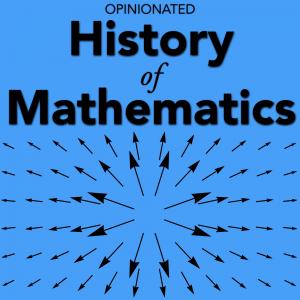Opinionated History of Mathematics

Latest Episodes
Did Copernicus steal ideas from Islamic astronomers?
Copernicuss planetary models contain elements also found in the works of late medieval Islamic astronomers associated with the Maragha School, including the Tusi couple and Ibn al-Shatirs models for
Operational Einstein: constructivist principles of special relativity
Einsteins theory of special relativity defines time and space operationally, that is to say, in terms of the actions performed to measure them. This is analogous to the constructivist spirit of class
Review of Netz’s New History of Greek Mathematics
Reviel Netzs New History of Greek Mathematics contains a number of factual errors, both mathematical and historical. Netz is dismissive of traditional scholarship in the field, but in some ways repre
The “universal grammar” of space: what geometry is innate?
Geometry might be innate in the same way as language. There are many languages, each of which is an equally coherent and viable paradigm of thought, and the same can be said for Euclidean and non-Eucl
“Repugnant to the nature of a straight line”: Non-Euclidean geometry
The discovery of non-Euclidean geometry in the 19th century radically undermined traditional conceptions of the relation between mathematics and the world. Instead of assuming that physical space was
Rationalism 2.0: Kant’s philosophy of geometry
Kant developed a philosophy of geometry that explained how geometry can be both knowable in pure thought and applicable to physical reality. Namely, because geometry is built into not only our minds b
Rationalism versus empiricism
Rationalism says mathematical knowledge comes from within, from pure thought; empiricism that it comes from without, from experience and observation. Rationalism led Kepler to look for divine design i
Cultural reception of geometry in early modern Europe
Euclid inspired Gothic architecture and taught Renaissance painters how to create depth and perspective. More generally, the success of mathematics went to its head, according to some, and created dog
Maker’s knowledge: early modern philosophical interpretations of geometry
Philosophical movements in the 17th century tried to mimic the geometrical method of the ancients. Some saw Euclidwith his ruler and compass in handas a doer, and thus characterised geometry as a
“Let it have been drawn”: the role of diagrams in geometry
The use of diagrams in geometry raise questions about the place of the physical, the sensory, the human in mathematical reasoning. Multiple sources of evidence speak to how these dilemmas were tackled in antiquity: the linguistics of diagram constructi...






 Visit Podcast Website
Visit Podcast Website RSS Podcast Feed
RSS Podcast Feed Subscribe
Subscribe
 Add to MyCast
Add to MyCast